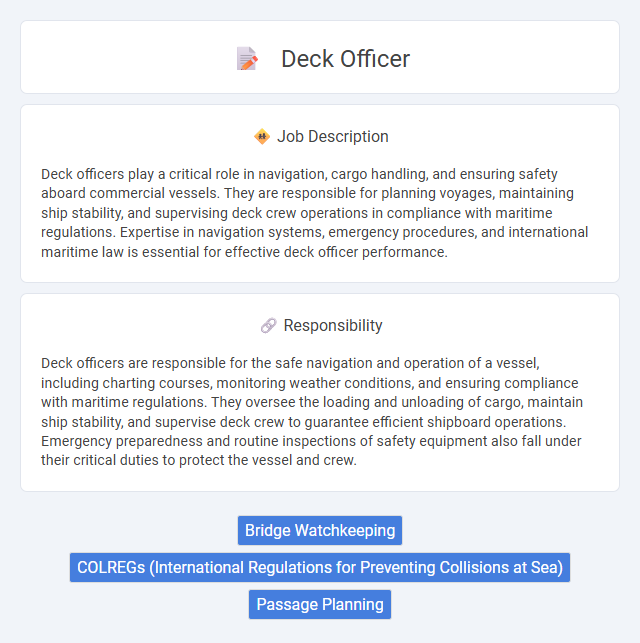
Deck officers play a critical role in navigation, cargo handling, and ensuring safety aboard commercial vessels. They are responsible for planning voyages, maintaining ship stability, and supervising deck crew operations in compliance with maritime regulations. Expertise in navigation systems, emergency procedures, and international maritime law is essential for effective deck officer performance.
Individuals with strong leadership skills, a high level of responsibility, and the ability to work under pressure are likely suitable for a deck officer role. Those who can adapt to long hours in challenging maritime conditions and possess good teamwork and communication abilities may find this job fulfilling. Physical fitness and resilience could also increase the probability of performing well in this demanding position.
Qualification
A deck officer must possess a valid officer of the watch certificate, typically issued by maritime authorities following completion of STCW (Standards of Training, Certification, and Watchkeeping) courses and sea service requirements. Essential qualifications include a bachelor's degree in nautical science or maritime studies and proven proficiency in navigation, ship handling, safety management, and cargo operations. Continuous professional development through simulator training and safety drills ensures compliance with international maritime standards and enhances operational competence.
Responsibility
Deck officers are responsible for the safe navigation and operation of a vessel, including charting courses, monitoring weather conditions, and ensuring compliance with maritime regulations. They oversee the loading and unloading of cargo, maintain ship stability, and supervise deck crew to guarantee efficient shipboard operations. Emergency preparedness and routine inspections of safety equipment also fall under their critical duties to protect the vessel and crew.
Benefit
A Deck Officer position likely offers competitive salaries and opportunities for career advancement within the maritime industry. Prospects for gaining valuable experience in navigation and ship management may enhance professional growth. The role probably provides exposure to international travel, fostering cultural awareness and personal development.
Challenge
A deck officer job likely involves managing complex navigation tasks and coordinating crew operations under unpredictable weather conditions, which can pose significant challenges. The role probably demands quick decision-making and thorough knowledge of maritime regulations to ensure ship safety and efficiency. These challenges may enhance problem-solving skills and require continuous learning to adapt to evolving technologies and industry standards.
Career Advancement
Deck officer career advancement involves progressive responsibility in navigation, ship handling, and crew management, leading from third officer to chief officer and ultimately to master mariner. Gaining certifications such as STCW (Standards of Training, Certification, and Watchkeeping) and completing advanced maritime courses significantly enhance promotion prospects within shipping companies and maritime organizations. Continuous experience accumulation and leadership development are critical factors for elevated roles in large commercial vessels, cruise ships, and offshore operations.
Key Terms
Bridge Watchkeeping
Deck officers are responsible for Bridge Watchkeeping, ensuring the safe navigation and operation of vessels. Their duties include monitoring navigational equipment, maintaining situational awareness, and executing collision avoidance protocols. Proficiency in radar, electronic chart display and information system (ECDIS), and communication with other ships or port authorities is essential for maintaining maritime safety.
COLREGs (International Regulations for Preventing Collisions at Sea)
Deck officers play a crucial role in navigating vessels safely by strictly adhering to COLREGs (International Regulations for Preventing Collisions at Sea), which establish standardized rules for vessel conduct to prevent maritime collisions. Their responsibilities include maintaining vigilant watchkeeping, interpreting radar and AIS data, and executing proper maneuvers as mandated by COLREGs to ensure safe passing, crossing, and overtaking situations. Mastery of these regulations is essential for risk assessment, collision avoidance, and compliance with international maritime law.
Passage Planning
Deck officers play a critical role in passage planning by developing detailed navigation plans that ensure the safe and efficient transit of vessels. They analyze nautical charts, weather forecasts, tidal information, and navigational hazards to chart optimal courses complying with international maritime regulations. Precision in passage planning helps prevent maritime accidents, optimize fuel consumption, and maintain onboard safety protocols throughout the voyage.
 kuljobs.com
kuljobs.com